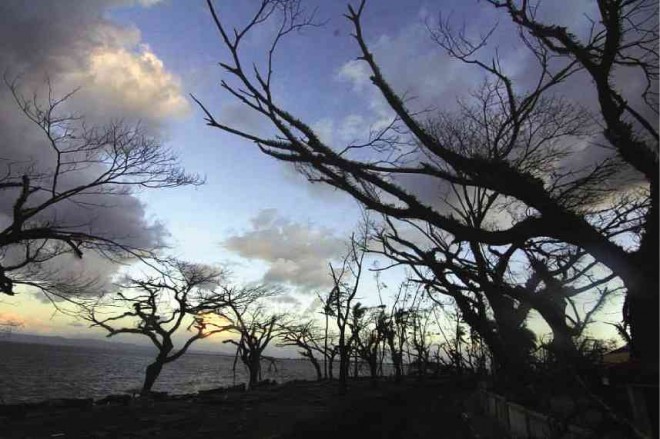‘Yolanda’ victims fend for selves on streets

TACLOBAN SUNSET Sunset in Tacloban City, which Supertyphoon “Yolanda” and government incompetence turned into a wasteland, casts a pall of gloom, but many residents draw courage from the certainty that the sun will rise again. MARK ALVIC ESPLANA/INQUIRER SOUTHERN LUZON
TACLOBAN CITY—Michael Opresie smiled as he glanced at the piglet that roasted on burning firewood that were actually pieces of debris picked up from the rubble of what used to be houses in a community flattened by Supertyphoon “Yolanda”on Nov. 8.
It was a sunny Tuesday and the contrast of images and smell in the area was stark.
The piglet roasts in the middle of a wasteland and its smell, while distinct, mixes with that of decaying corpses.
But Opresie is not deterred. He admits the smell of rotting human bodies still wafts in the air, but that his mouth waters in anticipation of the feast that awaits him and his family.
“We don’t have any choice,” he said. “We’re starving.”
Article continues after this advertisementThe animal roasting in the burning pieces of debris is between 2 and 3 months old and is a pet, according to Opresie. “We have to eat,” he said.
Article continues after this advertisementThe storm sent Opresie and his family fleeing their house in Fatima Village, one of the areas wiped out by the storm surge.
Opresie’s is a case that could belie government claims that relief has reached every village of the city.
They are still hungry and feel forgotten, he said. They are staying in a commercial building that had been abandoned at the height of the storm and that is just two streets away from the Leyte provincial capitol.
The Opresies are staying in the building with two other families—the Meneses and Bermudos—who fled their homes in the village of San Jose.
Gary Meneses, head of the Meneses family, said they left their home to watch over his stock of merchandise in the commercial building.
He said their house was destroyed and help was hard to come by.
Meneses said his and the other families were to share the roasted piglet for lunch. At least eight of them would dine on “lechon de leche.”

A SURVIVOR keeps watch over a piglet, previously a pet, roasting on burning pieces of debris picked up from the rubble of a community flattened by Supertyphoon “Yolanda” on Trece Martirez Street in Tacloban City. ANDREW TADALAN
Just across the street, Hermilito Yapi arrived with two gallons of water he fetched from a pipe that he and his neighbors forcibly opened.
He brought the water to a warehouse that served as a shelter for him and his family and 10 other people, mostly members of the Isidro family from the village of Milda.
“Can you please help me contact my sister Roselia in Manila? She might be worried about me because I cannot contact her,” Yapi told the Inquirer.
Like the three families in their temporary homes and every person now living on the street, Yapi and his companions have not had sufficient food in days.
He said they were able to survive by cooking vegetables, which were not yet ready for harvest, that came from his garden in Milda village. The plants miraculously survived the storm surge and had provided them with nourishment.
But it was not enough. The vegetables are gone now.
“We just fill ourselves with this water,” Meneses said, pointing to the gallons of water that he had carried to the warehouse. “We boil it but I think it’s not safe. There are too many dead people around here,” he added.
Yapi, the other survivor that the Inquirer interviewed, said he wanted to look for a source of potable water because that would help him and the other survivors now living on the streets keep surviving.
Amid all the despair and hopelessness around them, though, Opresie, Meneses and Yapi could still laugh loudly at the corniest of jokes.
When the Inquirer was taking photos of Opresie, the other survivors shouted in jest that it should land on Page One because Opresie looked handsome and he’s now a star. Their laughter filled the air, echoing through a community flattened by Yolanda but throbbing with life.
Meneses said he had reason to be happy. He is alive and so is his family and no one is missing. “I might just kill myself if I lose them, too,” he said.
“That’s how Filipinos are. A storm just hit us but we always manage to laugh,” he said.